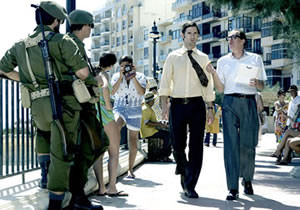But Is It Good for the Jews?
"Munich," Steven Spielberg and the perils of criticizing Israel.
On Christmas day Steven Spielberg picked up the phone and called critic Roger Ebert, breaking a near-total no-comment policy on his controversial new movie, “Munich.” Spielberg’s fictionalized, beautifully shot account of an Israeli hit squad sent to destroy the Black September plotters of the 1972 Munich massacre has been drawing heat–as well as press–for weeks now. Top film critics Kenneth Turan, David Edelstein, Manohla Dargis and Ebert himself all gave it raves. But despite the praise, Spielberg has also been attacked from all sides of the political spectrum –by Palestinians who complain that he leaves out the Palestinian point of view, by Jews who now think he’s “no friend to Israel,” and also by many critics who claim that the film’s critique of a cycle of revenge and retaliation is at best ahistorical and at worst dangerously nave.
Spielberg called Ebert to remind the world that his movie was intended to open a dialogue, to make us think, to provoke a reaction, you know, all those things directors say. But he also offered up a quote that will give his most cynical critics even more fodder for their next round of Spielberg-slamming: “What I believe is that there will be peace between Israelis and Palestinians in our lifetimes.”
If a reaction is what he wants, he’s getting it. “The prayer for peace,” as Spielberg has described “Munich,” opened Christmas weekend, and most of the critical community is calling for Oscars, most of the conservative Jewish community is calling for blood, and the few Arabs who have commented in the Arab press are accusing Spielberg of sticking with the Israeli point of view.
So which is it? Is “Munich” biased against Israel? Biased against the Palestinians? Or just oversimplified and nave?
I saw the movie on Christmas eve, in a theater full of Jews and one or two very pissed-off-looking Arabs. I’m an American Jew of Israeli parents, one who grew up on summer trips to the kibbutz back home, on dreams of fighting for The Cause like the rest of my family and on far too many young readings of Leon Uris’ “Exodus” to count. As such, I can only answer: Yes. And Yes. And Yes. Sort of. But, finally, no.
First we must remember Spielberg’s limitations as a filmmaker: A great entertainer, he has not been known for nuanced presentations of political history. “Schindler’s List” and “Saving Private Ryan,” his two most successful “serious” films, used historical events as backdrop for character dramas. In “Schindler’s List,” the villain was a sadistic concentration camp leader, an evil man whose evil, being personal rather than political, was easy to digest. In “Saving Private Ryan,” the hard questions about the value of human life during wartime gave way to a rousing celebration of brotherhood. Emotions, after all, fill a multiplex better than historical complexities, and they go better with popcorn (“Shoah” was a much sharper representation of the Holocaust than “Schindler’s List,” as the 14 people who saw it in theatrical release know well).
Spielberg is a popularizer–in the best and worst senses of the word–and so it should come as no surprise that “Munich,” for all its cinematic grandeur and gripping action, does not offer much to satisfy those seeking a historical context or a clear sense of the political realities of the Arab-Israeli conflict. Instead, “Munich” is just a pretty good thriller, though a thriller that frequently collapses under the weight of its message.
This message is threefold: (1) systematic revenge murders might not be a good idea; (2) the men who plotted Black September were human beings; and (3) killing other human beings can take a heavy psychological toll, on an individual as well as on a nation.
Taken on its own terms, it just doesn’t seem too radical. But nothing in the Middle East gets taken on its own terms, as one can see from the polarized responses to the film. The verdict from the Arab press is not yet in–“Munich” won’t open in the Middle East until next month, but so far the response has been far from adulatory. Mohammad Daoud, one of the original masterminds of the Munich massacre, blasted the film and complained about not being called as a consultant. As galling as it may be to see the mastermind of a devastating multiple murder giving press conferences, Muhammad does have a point: He might have been a useful consultant. As for putting a human face on the Palestinians, what would be the alternative? When American critics praised Hany Abu-Assad’s film “Paradise Now,” about two suicide bomber recruits, for “humanizing” Palestinian suffering, Abu-Assad retorted: “I did not intend to humanize. It’s obvious that they are humans.”
That humanizing the enemy in a thriller should be considered controversial at all is just one indicator of the polarizing nature of the subject matter, even among Jews. Or rather, especially among Jews. And that leads directly to the “Spielberg is selling out his people” argument, best articulated in David Brooks’ much-quoted New York Times piece last week. Brooks argued that setting the film in 1972 provided Spielberg with a convenient escape from today’s political context. “In Spielberg`s Middle East, there is no Hamas or Islamic Jihad,” he wrote. “There are no passionate anti-Semites, no Holocaust deniers like the current president of Iran, no zealots who want to exterminate Israelis.”
True. But in Spielberg’s Middle East there is also no Deir Yassin, no Stern Gang, no Sabra and Shatilla, no new illegal settlements. You could say both sides got off easy, as Spielberg avoids the kind of over-close scrutiny of motives and actions that might undercut the essential nobility of character he is aiming for. Instead, we get sympathetic characters across the board: The Palestinian murderers are fathers, intellectuals–one has even translated the “Arabian Nights” into Italian. The Israeli military commanders are dry, urbane sphinx figures like Geoffrey Rush’s Ephraim, the boss who understands all too well what kind of price his officers will pay for their actions. Even Spielberg’s Golda Meir is pretty and soft-spoken, murmuring in dulcet tones to Avner Kauffman, Eric Bana’s dark-eyed hero-assassin: “I like having strong, durable men around.”
As for the deadly team of remorseless agents, sent to leave a blood trail across Europe, they may as well be a Northern California men’s group. When not planning bombings, the ruthless Mossad assassins cook for each other, talk about their children, process each other’s meltdowns, endlessly debate the ethics of their actions, and, in classic Spielberg fashion, compromise their mission to save the life of an innocent little girl. Bana plays Kauffman as a man so torn with self-doubt that we could call him a Hamlet figure if he weren’t so good at getting things done. Even Steve, the blond, blue-eyed South African getaway driver and the only truly convincing Mossad tough (played by Daniel Craig, the next James Bond), spends too much time talking through his point of view, though he’s a bit more succinct than the others: “You don’t fuck with the Jews!” he gloats, after rejoicing over their first successful hit, and I was one of several people in the movie theater who cheered when he said it. To alleviate any guilt feelings, we are also given a kindhearted explosives expert, who cracks from all the killing, crying, “I was trained to dismantle bombs, not build them!” It’s great conscience-soothing, but not great cinema: Every time the men stop for moral struggle, the action stops too.
It wouldn’t be the first time the man behind “E.T.” has given in to sentimentality, but in this case, Spielberg is up against something new–a well-founded fear of the great Zionist wrist slap: Bad Jew! Bad Jew! How dare you criticize Israel? “I am as truly pro-Israeli as you can possibly imagine,” he assures Ebert. “Criticism is a form of love. I love America, and I’m critical of this administration. I love Israel, and I ask questions. Those who ask no questions may not be a country’s best friends.”
This love of Israel shines through every frame of the movie. From the moving photos of the slain athletes, accompanied by the haunting minor key of the Israeli national anthem, to the characters’ wry humor and blunt arguments (“You have to stop chasing the mice in own brain,” shouts Kauffman at one point, in a touch that is both pure sabra and pure Kushner), “Munich” reflects the peculiar tenderness that many American Jews feel for our brutish brother. We may not like his methods, but we do love knowing that if the schoolyard bully ever tries anything with us again, David Ben-Politically-Suspect-but-Tough-as-Hell will come and kick some royal gentile ass. Or Palestinian ass. It doesn’t matter whose, so long as we know there is someone out there who will say, like the remorseless Steve, “The only blood that matters to me is Jewish blood.” So in Spielberg’s troubled love letter to the beloved homeland, the assassins are glamorous and macho, but also reflective and remorseful–the Jews so many Jews wish they were. This is perhaps the most moving truth of the film, not a fact or an event but a mood, one which acknowledges the gauzy admiration that makes it so hard for the majority of American Jews to think clearly about Israeli actions. The problem is not only Israel’s actions but also her troubled and contested history. In Monday’s New York Times Edward Rothstein took issue with “Munich’s” approach to dealings with the issue of Israeli terrorism and counter-terrorism, arguing that the movie’s interpretation of events lies on a faulty premise. “[Spielberg] ends up treating the Munich massacre almost as if it were the original act of Palestinian terror,” wrote Rothstein. “The elimination of context makes the Israeli response seem intemperate, while all future acts of Palestinian terror are treated as if they were responses to the Israeli assassinations.”
The call for context is valid and necessary. Easy terms like “cycle of violence,” “terrorism” and “counter-terrorism” are all abstractions, one which both Zionists and anti-Zionists take offense to for very different reasons. One act of terror is another man’s act of war: Take the classic “Battle of Algiers,” a film that Americans have no problem admiring, in part because its players are Frenchmen and North Africans, and so the conflict belongs to someone else. In that film, one of the revolutionaries blasts a journalist for suggesting that his tactics–such as putting bombs in baskets and handbags–are cowardly. “If we had your airplanes it would be a lot easier for us,” he snaps. “Give us your bombers, and you can have our baskets.”
The Algerians were terrorists in the eyes of the French, as were the first Jewish freedom fighters in the eyes of the British. Palestinians have also said, over and over, give us your tanks and you can have our suicide bombers. Rothstein is correct; context is everything. The mechanisms for the current crisis in Israel were not set by the Munich killings. But neither did the Munich killings erupt out of a vacuum, or out of some black caldron of fanatical, maniacal hatred: The men of Black September wove a nasty and brutal basket, and they managed to turn that basket into one of the most effective acts of political theater of the last century, one which was just one bloody stage in a series of battles that have taken far more civilian than military lives ever since Jews and Arabs first started fighting over the same miserable stretch of British-ruled land. I am not suggesting that there was anything morally excusable about the massacre of the Jewish athletes in Munich, but war is ugly, and most of the Israelis I know are much less squeamish than the therapeutically inclined hit team of Spielberg’s imagination. They are not afraid to call a war a war.
But whose war? Critics like Rothstein demand historical context, but the history of Israel is not exactly clear. Should we turn to the myth of Israel’s birth as we know it through “Exodus”? Or the history of Israel as it has been rewritten by revisionist Israeli historians like Tom Segev and Benny Morris? Or even that same history as remembered by the Palestinians themselves?
Spielberg wisely chooses to keep his attention on these questions to a minimum, despite several poignant conversations between Avner Kauffman and his ultra-Zionist mother, who tells him she does not want to know the grisly details of his fight for their country, and also between Kauffman and a young Palestinian, who reminds him that he and his people will wait as long as it takes to get their land back. The question of “Munich” is very specific: What is the final cost of retaliation and revenge? The only answer Spielberg can give us is Kauffman’s own anguished non-answer: “There is no peace at the end of this.” And he is not wrong.
As for the American war on terror, is there peace at the end of this? The most effective act of political theater of this century was of course the horrifying destruction of the World Trade Center. For this reason, Spielberg’s final shot, an image of the Twin Towers, is the film’s greatest cipher, and how one reads that image is a good indicator of how one reads the movie. Many of the critics who praised the film see it as a perfect close to the cycle-of-violence argument. Others make the dubious claim that the image of the towers should remind us how important it is to mete out swift and terrible justice to those who would hurt us.
Still other critics praise the film but question the appropriateness of the final image, for good reason: Munich and Sept. 11 have nothing whatsoever in common. The Palestinian fight for a homeland is very different from Al Qaeda’s war on America, and the two merit no comparison on the level of historical realities, even if Al Qaeda and other terrorist organizations of the Arab world have become such sinister manipulators of the plight of the Palestinian people for their own ends.
However, on the symbolic level at which great art operates–and for all its flaws, there are great moments in “Munich”–the comparison between Munich and Sept. 11 is real and necessary. The real Golda Meir and her advisors genuinely believed that retaliation would make the world safer for Jews. “If we give in,” said the real Meir after Munich, “then no Israeli in the world can feel that his life is safe.”
But in a post-Sept. 11, post-intifada world, no Israeli, or American, can feel that his life is safe. Geographical distance and open borders will not keep us safe. That’s a lesson America has not learned. Heavily patrolled borders and shamefully enforced occupation will not keep a country safe either, a lesson Israel has not learned. There is no hope but peace. And Spielberg’s cinematic plea for that peace is naﯯve, yes, historically inaccurate, yes, too concerned with its own nobility, certainly. But even more nave, in 2005, is the belief that survival can be bought by violence. W.H. Auden’s “September 1st, 1939” was one of the most circulated poems following Sept. 11. With the closing image of “Munich,” Steven Spielberg brings home the poem’s last line with a new urgency: We must love one another or die.
Independent journalism is under threat and overshadowed by heavily funded mainstream media.
You can help level the playing field. Become a member.
Your tax-deductible contribution keeps us digging beneath the headlines to give you thought-provoking, investigative reporting and analysis that unearths what's really happening- without compromise.
Give today to support our courageous, independent journalists.




You need to be a supporter to comment.
There are currently no responses to this article.
Be the first to respond.